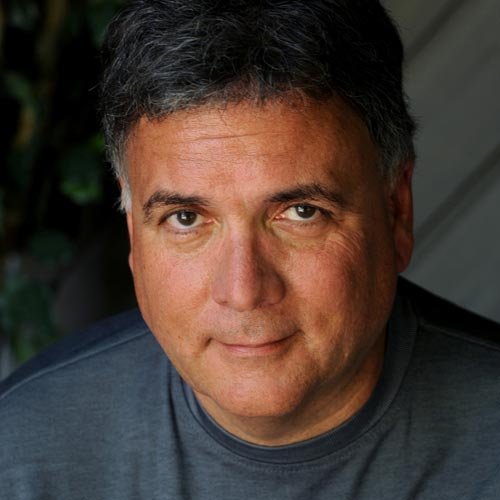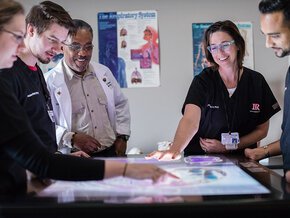Narrative Healthcare Certificate
The Narrative Healthcare Certificate offers narrative competency training to physicians, nurses, social workers, mental health professionals, chaplains, social workers, academics and all those interested in the intersection between narrative and care.
Lenoir-Rhyne seeks to develop the narrative future of medicine, a field that proposes that effective care requires increased human engagement. Narrative training builds empathy, a skill required for effective care.
The certificate prepares practitioners with enhanced skills in listening to patient and client histories and stories and cultivates a more profound attention to the meaning of illness and struggle, beyond the diagnosis of it. Those who complete the Narrative Healthcare Certificate program to supplement licensure and professional degrees will be prepared to expand the narrative culture within healthcare through program development, research, writing, supervision and training of colleagues and students.
Request Information
Take the next step toward completing a Narrative Healthcare Certificate at Lenoir-Rhyne University.
Get StartedTake the next step toward completing a Narrative Healthcare Certificate at Lenoir-Rhyne University.
Program Overview
The Narrative Healthcare Certificate program offers a sampling of aesthetics-based methodologies, which help build empathy, communication, better care and mindfulness. Students read, write and discuss issues as teams in the disciplines listed below. Online courses with Zoom symposia comprise the program.
The program seeks to support practitioners who recognize the value of patient-centered care. Using the Robert Wood Johnson publication “The Narrative Playbook” as a guide, students venture into the multiple roles of story—as communication, as healing process, as diagnostic tool, as prevention of burn-out and as medicine itself. The certificate offers the following disciplines.
Narrative Medicine
Narrative Medicine applies narrative theory to the context of the clinical care. A protocol for intervention in the loss of empathy experienced during medical training Narrative Medicine employs close reading, reflective writing, and witnessing to develop our ability to attend to, interpret, metabolize and be moved by patient stories. The Narrative Medicine modules of this program are grounded the work and teachings of Dr. Rita Charon and her team at the Narrative Medicine program at Columbia University Program for Physicians and Surgeons.
Expressive Writing
Expressive Writing invites patients, providers, and caregivers to apply various modes of writing to healing. Supported by facilitators, individuals develop meaning from trauma and stress. Students of Expressive Writing discover data supporting writing’s ability to reduce anxiety and increase resilience. The Narrative Healthcare Program works closely with John Evans, co-author with James Pennebaker of "Transform Your Health: Writing to Heal" and facilitator for Duke Integrative Medicine workshops on expressive writing.
Poetic Medicine
Based in the work of John Fox of the Institute for Poetic Medicine, explorations in Poetic Medicine include study of metaphor as transformative agents in healing. Students write and read poems of witness and experience while learning about Poetic Medicine programs.
Arts in Medicine
Arts in Medicine programs such as that at Shands Hospital at University of Florida integrate arts into healthcare. Murals on hospital walls, guitarists strumming Bach at bedside, creative writing sessions, dance despite disability all enrich patient experience of illness and help them discover personal paths to healing beyond diagnosis. Students are encouraged to envision and create programs.
Medical Humanities
Medical Humanities programs have co-existed with medical education for decades. Their purpose is to encourage providers to see the whole human when treating pathologies. As with Narrative Medicine, students view films and paintings and read stories. Such works address illness and healing, the interior experience of healthcare.

Whether you’re in Asheville on campus or 1,000 miles away like I was, you always feel like you’re part of the program and you shouldn’t hesitate because of distance.
Program Requirements
The certificate program in Narrative Healthcare at The Thomas Wolfe Center for Narrative offers narrative competency training to physicians, nurses, social workers, mental health professionals, chaplains, social workers, academics and all those interested in the intersection between narrative and care. Lenoir-Rhyne University seeks to develop the narrative future of medicine, a field that proposes that effective care requires increased human engagement. Narrative training builds empathy, a skill required for effective care.
The certificate prepares practitioners with enhanced skills in listening to patient and client histories and stories and cultivates a more profound attention to the meaning of illness and struggle, beyond the diagnosis of it. Those who complete the narrative healthcare certificate program to supplement licensure and professional degrees will be prepared to expand the narrative culture within healthcare through program development, research, writing, supervision and training of colleagues and students.
The courses required for the certificate in narrative healthcare include:
-
Certificate Requirements
- WRI 545 - Introduction to Narrative Medicine: Narrative as a Form of Knowledge
- WRI 546 - Narratives of Illness
- WRI 547 - Narratives of Care
- (Choose one of the following courses)
- WRI 520 - Workshop in Writing Fiction
- WRI 521 - Workshop in Writing Creative Nonfiction
- WRI 522 - Workshop in Writing Poetry
- WRI 583 - Special Topics in Creative Writing
News & Events

Healthcare professionals, students and community partners are invited to Lenoir-Rhyne on March 26 to explore topics in comprehensive, patient-centered care.
View More
Applied AI lab format emphasizes productivity, ethics and accountability as workforce demand for AI fluency accelerates. Begins March 3.
View More